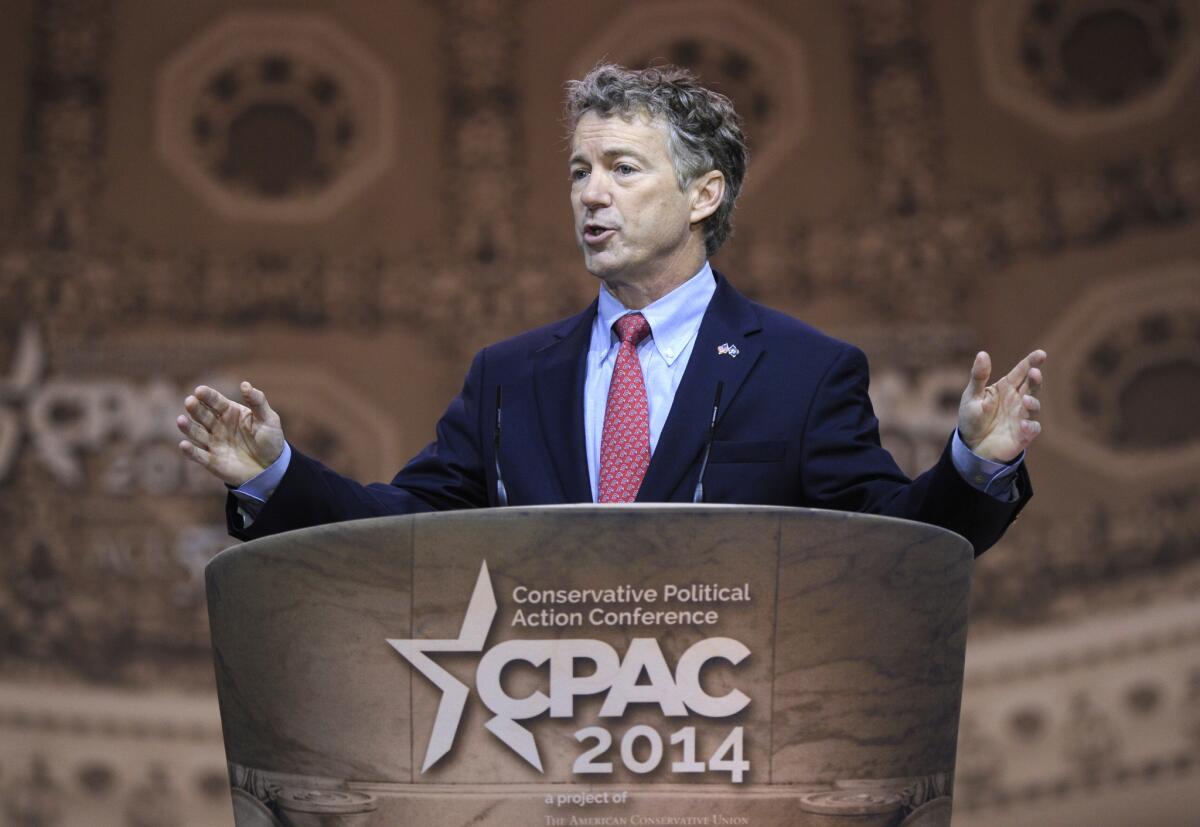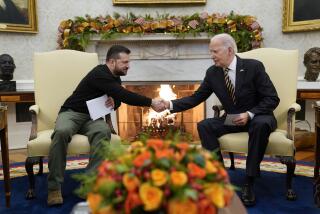Rand Paul foreign policy views find support among CPAC conservatives

OXON HILL, Md. — For many of the 2016 presidential contenders who tested their messages at the Conservative Political Action Conference this week, Russian President Vladimir Putin’s incursion into Ukraine offered the perfect opening to pound President Obama’s approach to foreign policy as weak and feckless — a sign of dimming U.S. influence around the world.
But Rand Paul, whose non-interventionist foreign policy views have often been out of step with his rivals, did not mention Russia at all. And yet he blew the doors off Friday, drawing the most excited response of any potential contender as he blistered the Obama administration for its expansive surveillance of Americans and accused the president of trampling on civil liberties.
It was a reminder that while GOP foreign policy hawks are loud, they are not necessarily ascendant, particularly among the younger ranks of the party.
Paul angered conservative Christian groups last fall by suggesting that some allies of Israel “think war is always the answer” and raised eyebrows in January with his opposition to further economic sanctions on Iran while negotiations over its nuclear program were underway. This week, he found himself the target of some party leaders who view the crisis in Crimea as an opportunity to argue for a more muscular, interventionist approach abroad.
But in interviews with rank-and-file members at the annual gathering of conservatives, attendees were far more likely to praise Paul’s foreign policy views than condemn them. And Paul, who defended his more reserved stance on Russia in a talk radio interview Friday and outlined his views on Putin’s moves in an opinion piece for the conservative website Breitbart.com, knew his audience Friday.
As the youthful crowd of conservatives filled the hall here on the outskirts of Washington, Paul skipped the complexities of U.S. policy toward Ukraine. Instead, he outlined the actions that have powered his rise in the party, including his filibuster opposing drones and the class-action lawsuit he filed against Obama in February charging that the NSA’s collection of phone records violates the 4th Amendment, which protects Americans from unreasonable search and seizure.
“If you have a cellphone, you are under surveillance. I believe what you do on your cellphone is none of their damn business,” Paul said, drawing a roar from the crowd Friday. “I don’t question President Obama’s motives, but history will record his timid defense of liberty.”
“Our rights are innate, they come from our creator and no government can take them away from us,” he said, as some in the crowd whistled in agreement. “The Constitution merely codifies what exists before all time. Mr. President, we won’t let you — we will not let you run roughshod over our rights. We will challenge you in the courts. We will battle you at the ballot box. Mr. President, we will not let you shred our constitution. Our future hangs in the balance.”
Paul’s emphasis on what he termed the administration’s overreaches on civil liberties stood in sharp contrast to calls by his rivals for a more aggressive approach to foreign policy around the world.
A day before, Sen. Marco Rubio of Florida argued that “flawed foreign policy of the last few years” had emboldened totalitarian nations, citing in particular China, North Korea, Venezuela and Cuba. Arguing for more forceful positioning by the United States, he said U.S. foreign policy should be “deeply rooted in our values and in our moral principles.” Every human being has rights given to them by their creator, Rubio said, and “any government and any leader who violates those rights is an illegitimate one.”
“There is nothing normal or acceptable about a government that does not allow you to worship as you please. There is nothing moral or acceptable about a government that forces women to have abortions. There is nothing moral or acceptable about a government that slaughters people in the streets,” Rubio said. “There is nothing moral or acceptable about a government that jails political opponents. There is nothing moral and acceptable about governments that sponsor terrorism as a tool of statecraft. And we should never accept any of those things as a legitimate form of government.”
Other potential presidential candidates suggested that Obama’s accommodation of Putin in certain areas had encouraged the Russian leader’s efforts to expand beyond his nation’s borders.
Sen. Ted Cruz of Texas, who referred to Putin as a “petro-tyrant,” argued that “hope has diminished across the world” after five years of Obama’s tenure: “The people of Ukraine have seen Russian tanks move into their sovereign land, as the nation of Israel has been left without its friend and ally.”
“The only time Vladimir Putin shivers is when he has his shirt off in a cold Russian winter,” former Arkansas Gov. Mike Huckabee said in his address Friday. “No one trusts us, no one listens to us, no one respects us and no one fears us.”
But the clear favorite here was Paul, who rose to prominence with calls for a more swift withdrawal from Iraq and Afghanistan, an epic filibuster opposing drone strikes, and his arguments the U.S. should pull back from its international engagements to spend more of its resources at home. While a full-throated defense of Israel is part of the canon for Republican candidates, Paul was one of the few 2016 contenders who did not mention that issue here.
That lack of emphasis bothered Ariel Kohane, a Republican Party activist from New York City attending the conservative gathering. He said before Paul’s speech that he had ditched his Rand Paul T-shirt and banner, concerned that the senator has “beat around the bush” on questions about Israel. Because of those concerns, Kohane said he was likely to vote for Cruz in Saturday’s presidential straw poll: “Sen. Cruz is definitely much more pro-Israel than Rand Paul.”
But many others, like Conor Kilgore, a New Hampshire high school student who came to a Paul book signing, said they liked Paul’s more tempered approach.
“I think he has a healthy perspective because there is some sort of balance that needs to be struck,” Kilgore said. “We are a force for good but we have to focus on what we are doing at home as well.”
Mark Mezzina, a 20-year-old student at Merrimack College in Massachusetts, said he connected with Paul in part because their foreign policy views were in sync.
“People my age have grown up with a decade of war and we’re tired of it,” Mezzina said. “When people like Sen. Marco Rubio push for more war, more bombing and sending troops overseas, it’s not something that appeals to my generation.”
Twitter: @maevereston
Twitter: @danielrothberg
More to Read
Start your day right
Sign up for Essential California for news, features and recommendations from the L.A. Times and beyond in your inbox six days a week.
You may occasionally receive promotional content from the Los Angeles Times.







